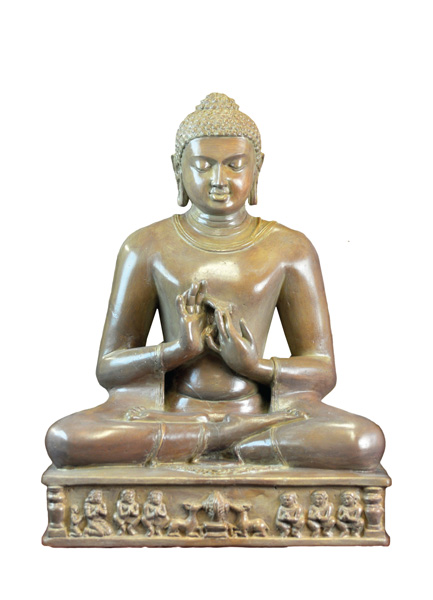Question from Celsa
Because this world and our life is ‘suffering’, there is no hope that the suffering will go away, and it’s useless to try to fix the world’s problems. Of course, the obvious solution would be that every person becomes virtuous and behaves in a moral way, so suffering can decrease. This is not feasible at a mass level, so maybe humanity is hopeless? and there is no way out, except individually? Why is it so hard to surrender desire, doubt, anger, etc. Aren’t the 5 hindrances our very inherent makeup? And if one eliminates them, one ceases to exist? Isn’t Desire the very motive of existence, keeping us eating and reproducing? Does Buddhism say that human life is absurd?
Response from BC
Celsa, I’m sorry to hear so much despair, and I know most people feel this way at this stage in history (or any other stage). Let me try to put the role of Buddhism in all this into perspective to show how Buddhist practice helps make the world a better place and the individual more fulfilled.
Let’s start with the issue of our inherent makeup. You’ve probably heard the following little story.
An old Cherokee is teaching his grandson about life. “A fight is going on inside me,” he said to the boy. “It is a terrible fight and it is between two wolves. One wolf is evil – he is anger, envy, sorrow, regret, greed, arrogance, self-pity, guilt, resentment, inferiority, lies, false pride, superiority, and ego. The other is good – he is joy, peace, love, hope, serenity, humility, kindness, benevolence, empathy, generosity, truth, compassion, and faith. The same fight is going on inside you – and inside every other person, too.”
The grandson thought about it for a minute and then asked his grandfather, “Which wolf will win?”
The old Cherokee simply replied, “The one you feed.”
This really says that we have two incompatible inherent makeups; this is the human dilemma. The Buddha never spoke in these terms, but notice that the qualities of the two wolves correspond almost precisely to what to Buddha regards as unskillful/unwholesome kamma, and skillful/wholesome kamma respectfully, so I’ll run with it. In fact, the Buddha has a lot to say about the psychological differences between the two wolves. Dependent coarising is an apt description of how the evil wolf’s mind works. (I have a bit of trouble picturing a good wolf. Maybe a highly domesticated collie like Lassie counts as a wolf.)
It seems like the evil wolves are getting plenty to eat these days, certainly among public figures and the powerful. Our individualistic, “Greed is good” culture favors evil wolves (not all cultures do). However most religious traditions, if they have not been corrupted, favor good wolves. Buddhism unambiguously favors feeding the good wolf. For the Buddha that is the one inherent human makeup that counts, and that must be developed and cultivated.
Most people think when the evil wolf is in charge it is good for “me,” but bad for others, when the good wolf is in change it is good for others, but bad for “me,” so they try to balance the two: “If I give to them, there is less for ‘me.’ Mostly I care about ‘my’ happiness, but I am not indifferent to theirs.” They feed both wolves, maybe the evil wolf a bit more.
For the Buddha, this balance makes no sense at all, for a well-fed good wolf is always far far happier than a well-fed evil wolf. The reason is that each wolf experiences a different kind of happiness: for the evil wolf happiness is mundane, based on sense pleasures, fleeting and unreliable. For the good wolf it is supramundane, is based on contributing to greater things including others, just accumulates, and leads to a fulfilling, meaningful life well lived. Only the good wolf can be fulfilled spiritually. This is the fruit of good kamma, that many in our hyper-individualistic culture fail to recognize.
How does Buddhist practice therefore make the world a better place?
The adept Buddhist brings ceaseless benefit to those around him or her, though compassionate action, though cooperation in group pursuits, through harmonizing with them, through example and teaching. This is our inherent nature, the one worth developing and cultivating, the one concerned with something greater than the individual self, in that it includes others.
It may be frustrating that the world overall does not seem to improve, but that is just “all or nothing” thinking. Helping a few others is huge in itself. Contributing the to the frustration is that we commonly do not see the far-reaching consequences of our influence, but they there. (I can think of various people whom I barely knew who have no idea of the influence they had on my life, like the odd Polish man in a suit and carrying a briefcase that I picked up hitchhiking in Corte Madera, California over fifty years ago, with whom I had a conversation about languages, and who recommended a book for me to read, before I dropped him off.) It is best to practice in small communities of like-minded people, where we can actually see the world getting a bit better, at least in one place, and where we are working together with others to accomplish this. Community was essential in the Buddha’s thinking.
But even if the world does not become a better place, or we fail to see it, we individually will live much more fulfilling, meaningful lives for having dedicated our practice to something greater than ourselves, to living as good wolves according to the standards of Dhamma.
In summary, yes Buddhism does say that human life is absurd. But Buddhism knows how to make it sane, just not for everybody all at once.

Leave a Reply